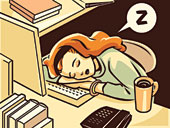 |
Indians have always slept on the job. Only in the conventional sense, however (and we’ll leave that for the erudite reader to figure out). But it is quite fashionable to portray yourself as a victim. So the reports on a recent survey talk about “one-third of working Indians being sleep deprived”. These professionals, says the survey by Regus, a provider of flexible workplaces, sacrifice sleep to fit in personal and work commitments by waking up early or by burning the midnight oil.
There is, of course, the larger two-thirds which hits the hay more regularly and has no aspirations of being up with the lark. But that is just a statistic. Also, the survey says that globally the sleep challenged amount to 35 per cent. So Indians would seem to be somewhat better off.
What do they do when they don’t sleep? An US survey of different ethnic groups (see box) provides an answer. Asians (which would have a large chunk of Indians) surf the Internet. But they don’t watch too much TV; it is difficult to appreciate American football until you are a third generation US citizen.
It is actually good going compared to their brethren in Asia. According to an ACNielsen survey, 40 per cent of Asia Pacific consumers aren’t in bed until after midnight. The top 10 night-owl nations (in order) are Portugal, Taiwan, Korea, Hong Kong, Spain, Japan, Singapore, Malaysia, Thailand and Italy. There are seven Asian countries in this bleary-eyes lot. “The earliest to bed in Asia-Pacific are the Australians, with 24 per cent in bed by 10 pm, followed by 19 per cent of Kiwis,” says the report. India also appears among the relatively early birds in the survey.
When you are young, you supposedly need your beauty sleep. As you grow older, you sleep less. During the active, working phase of your life, you should spend every waking moment energetically bouncing around. It doesn’t happen that way. In India, workers have been traditionally used to their afternoon siesta, and extended lunches at the canteen or clubhouse are still the order of the day. Shopfloor workers spread a newspaper and go to sleep on it. The CEO shuts his cabin door and tells his secretary he’s talking to New York. But isn’t it past midnight in New York? Aren’t they sleeping there? Yes, and they are sleeping here too.
Research in India has so far concerned itself with the lack of sleep, not an over-abundance of it. The Indian Society for Sleep Research and Philips Healthcare have started a career development programme for sleep technicians. “Sleep medicine is advancing in India by leaps and bounds,” says the society. “Many state-of-the-art sleep laboratories are being set up in government as well as private hospitals. The sleep technicians are an integral part of these laboratories.”
Lack of adequate sleep can cause irritation and carelessness in the workplace and lead to accidents. This is very often a psychological problem and can be caused by monetary and other worries. HR departments now have a lot of additional handholding to do.
Today, a new variable has entered the picture — more than the “how much” of sleep, it is the “when” of sleep. The power nap, in which you snatch 20 minutes of sleep during the day, is becoming quite the favourite with old-timers. That’s understandable; 20 years earlier, they would have drunk a cup of coffee. But research shows that a power nap can help today’s coffee drinkers too. Apple, Google, Prentice Hall and Deutsche Bank all have meditation rooms. The music can be hypnotic. Pass the yoga mat and the pillow, please.
THE BIG SLEEP
Survey findings of the sleep habits of different ethnic groups in the US
Asians are the least likely (9%) to say that they “rarely” or “never” have a good night’s sleep, compared with 20% of Whites, 18% of Blacks/African-Americans and 14% of Hispanics.
The poll shows that Asians are more than twice as likely to use the Internet every night in comparison to any other group (51% versus 22% Whites, 20% Blacks/African-Americans, 20% Hispanics). They are also the least likely to watch TV an hour before sleep (52% versus 64% Whites, 72% Hispanics and 75% Blacks/African-Americans).
Asians report the use of herbal and alternative therapies at rates similar to Hispanics (2% each), but less than Whites (4%).
Asians report the lowest rates of losing sleep owing to personal financial concerns at least a few nights a week (9% versus 22% Hispanics, 20% Whites and 19% Blacks/African-Americans).
Source: National Sleep Foundation










